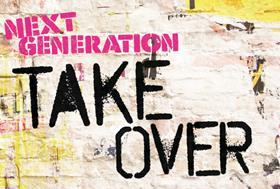This week we have invited in a group of graduates to take the reins of the magazine to understand the construction industry from a fresh perspective


If anyone over the age of 40 tries to “get down with the kidz”, they seem doomed to embarrass themselves – witness Steve Buscemi’s back-to-front baseball cap-wearing, 50-something character in US series 30 Rock feebly attempting to pass himself off as a teenager with his cringeworthy greeting to high school students: “How do you do, fellow kids?” It became a meme that’s done the rounds on social media for years.
That’s not to say older generations shouldn’t be interested in what younger people are thinking, feeling and doing, just that you’ll likely to come unstuck the moment you make assumptions about their wants and needs.
This is a warning any construction executive in a leadership role should heed – you work in an industry crying out for young recruits and yet despite years of piecemeal efforts their numbers are failing to replace those retiring. Could the often-overlooked problem be that the people at the top of the tree are disconnected from the people who have not reached the first branches?
Young professionals reject the idea their generation has unrealistic expectations of the workplace, or are prone to moaning if they don’t get what they think is their due. That’s just a stereotype trotted out about millennials
Lack of time is no doubt the culprit. Business leaders are busy developing the strategy, while line managers are busy implementing that strategy, so who has time to make sure anyone understands any of it? Young staff are probably the hardest group of employees to reach – they can be more easily intimidated and may hold back from raising concerns or asking questions. But arguably they are the most important people to plug into any business vision. For many reasons younger people have quieter voices – they may need their ideas validated or help connecting with others – so all the more important to listen well.
That’s why we have invited in a group of graduates to take the reins of the magazine this week in what we are calling – Buscemi’s character would approve of the hashtag – the #NextGenerationTakeover. We wanted to understand the construction industry from a fresh perspective and so most of the content – barring the news and legal sections – is dedicated to issues our guest editors have identified as important to them. Their ideas came out of a brainstorming session held at Building’s offices in (oh-so-cool) Shoreditch, and the following pages are the result.
Building’s Next Generation takeover: what’s the story?
We want change! What young people in construction really think
Our main takeaway from the day was that this group of young professionals did not just want to focus on problems – as we journalists so often do – they wanted to explore solutions. It makes sense: these are people in their early 30s or younger who are paid to be problem solvers. They reject the idea their generation has unrealistic expectations of the workplace, little sense of loyalty or are prone to moaning if they don’t get what they think is their due. That’s just a stereotype trotted out about millennials.
Our guest editors care a great deal about not only their own careers and the companies they work for, but also the health of the wider industry and the state it will be in for future generations. They very sensibly suggested a good starting point would be to conduct a survey of young peoples’ perceptions of construction as a career, focusing on those who have taken an active choice to join the industry whether through study or paid work. So we did that.
There were some really positive findings from the survey, namely that the vast majority are happy in their course or job (90%) and find it rewarding (when asked what they like about it, the words that most frequently cropped up were “challenge”, “variety” and “sense of satisfaction”).
But our survey respondents were also willing to be critical on some key issues that directly affect them. When asked an open question about how the industry could improve, the most common issue that came up was pay and working hours, followed closely by increasing diversity, and then addressing the gender imbalance. Other areas of concern were construction’s credentials on sustainability and its ability to modernise. But it was clear from the wording of some of the responses that working conditions is a real bugbear for a substantial number. If you’re involved in recruitment and retention, this is your wake-up call.
But we have so much more packed into this edition, which you can read over the next few days. We have a column from an expectant mother and a wishlist of how the construction industry could be; meanwhile, we sent a couple of our journalists for a sleepover at a build-to-rent scheme in Wembley – BTR being a housing tenure specifically marketed at the younger demographic – and we sat in on some reverse-mentoring sessions to witness intergenerational learning. Plus, our guest editors share digital hygiene tips and offer up some successful outreach work that is managing to engage youngsters. And let’s not forget our special podcast with bonus material we couldn’t fit into print, which you can listen to from Friday.
It’s been fun to watch this magazine take shape under a collective guest editorship – and we would like to thank all of those involved for their ideas and enthusiasm. It’s good to hear new voices and we intend to keep listening.
Chloë McCulloch, editor, Building



























No comments yet